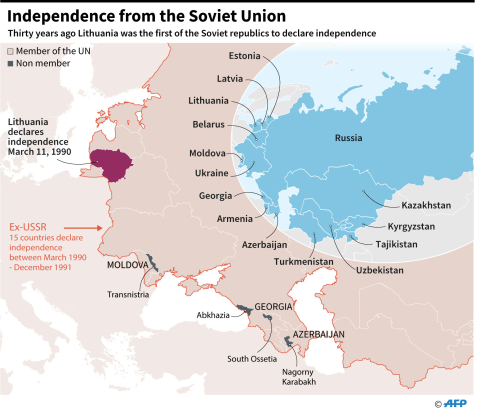Lithuania leads the road to independence
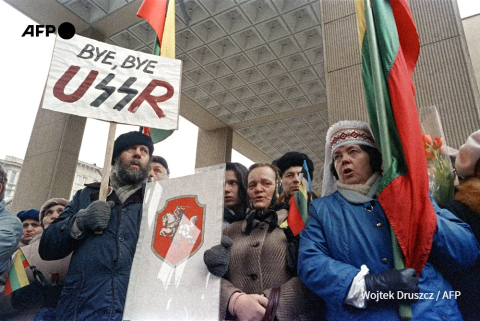
Lithuania became the first Baltic state and the first of the 15 Soviet republics to declare its independence on March 11, 1990, unleashing a process that led to the death of the USSR.
- Nationalist impetus -
Like its Baltic neighbours Latvia and Estonia, Lithuania was occupied by the Red Army during World War II. Hundreds of thousands of its citizens were deported to Siberia and central Asia by Stalin in the 1940s and 1950s.
Moscow maintained an iron grip until the arrival at the Kremlin in 1985 of Mikhail Gorbachev.
His reforms allowed nationalist sentiment in the three republics, the three most western oriented of the Soviet Union, to grow.
In late 1988 popular fronts were created in Estonia and Latvia, while in Lithuania the Sajudis movement led by Vytautas Landsbergis saw a sudden upsurge in support.
- Secret protocol -
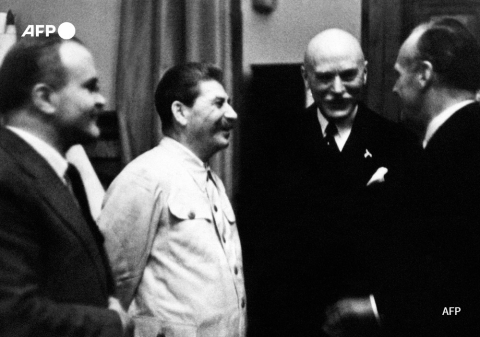
The movements all demanded "sovereignty",that their national languages, long threatened by the policy of "russification" be defended, and the Soviet Union acknowledge the secret protocol Stalin agreed in the Molotov-Ribbentrop non-aggression pact with Nazi Germany which led to their annexation.
This secret addition to the pact signed on August 23, 1939 enshrined the share out by Hitler and Stalin of Poland and gave the then independent Baltic states to the Soviet Union.
Moscow, which denies the existence of the protocol, says the three states came over voluntarily. The West, for its part, never accepted the inclusion of the Baltic states in the USSR, considering they had been annexed.
- Outburst -
On the 50th anniversary of the pact, the Baltic states launched a joint appeal for the end of the Soviet occupation.
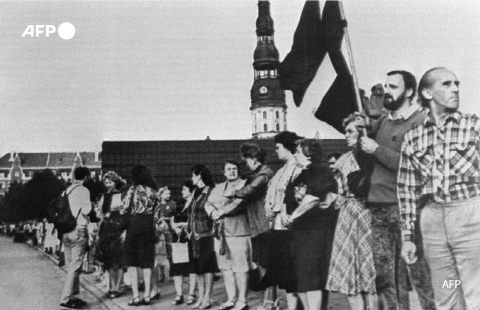
Forming an immense human chain, nearly two million people held hands along the 560-kilometre road linking the three Baltic capitals, Vilnius, Riga and Tallinn.
Lithuania created its own communist party independent from Moscow, effectively creating a multi-party system.
With this unprecedented feat a taboo had been broken.
In December 1989 Soviet deputies declared all the secret protocols of the Molotov Rippentrop Pact "nul and void", recognising for the first time their existence. But they did not challenge the validity of the annexation of the Baltic states.
The Baltic states also managed to extract the go ahead for a form of economic autonomy.
Their native languages also became official.
- Revolution in the East -
1989 was also the year of revolution in communist Eastern Europe which had been in Moscow's orbit since World War II.
The fall of the Berlin Wall on November 9 sped up the collapse in the space of weeks of hardline communist regimes in Bulgaria, Czechoslovakia and Romania.
It also helped reforming nations, led by Hungary and Poland, where the first partly democratic elections in the communist bloc saw victory by the Solidarnosc trade union of Lech Walesa.
- Declarations of independence -
Elections to the Soviet republics' parliaments in early 1990 resulted in landslide victories for nationalists.
The Lithuanian parliament on March 11 proclaimed its independence and the restoration of its sovereign rights. Estonia followed, but more cautiously, and in May Latvia in turn proclaimed its independence, albeit with a transition period.
Following in the footsteps of the Baltic states, most of the Soviet republics pushed to break free in 1990.
The Russian Federation, the biggest republic, led by the reformist Russian Boris Yeltsin, proclaimed its sovereignty in June. Ukraine followed in July.
- Bloodshed in Vilnius -
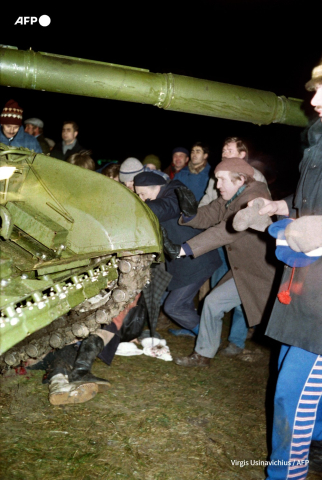
Faced with the situation in Vilnius, the Kremlin hit back with and energy and economic blockades of Lithuania.
Tensions mounted culminating tragically on January 13, 1991, when the Red Army attacked the headquarters of Lithuanian television, killing 14.
The situation also turned deadly in neighhouring Latvia where a week later, with Soviet special forces attacking the interior ministry in Riga, killing five.
- International recognition -
The failed coup in Moscow in August 1991 sped up events. Plotted by reactionary communists, the coup failed after Yeltsin led the resistance.
Estonia, followed by Latvia, took advantage of developments to declare their independence, which was recognised by Yeltsin's Russia.
On August 24, Gorbachev was forced to stand down as general secretary of the Soviet Communist Party, which was then suspended across Soviet territory as republics one by one declared their independence.
Three days later the then 12-nation European Economic Community (EEC) recognised the independence of the Baltic states. The United States followed.
The USSR recognised their independence on September 6, and they were admitted to the United Nations on the 17.
With the leaders of Ukraine and Belorussia, Yeltsin declared the "USSR is ceasing its existence" on December 8, 1991.
The three Baltic states joined the European Union and NATO in 2004, 13 years after being freed from Soviet domination.
